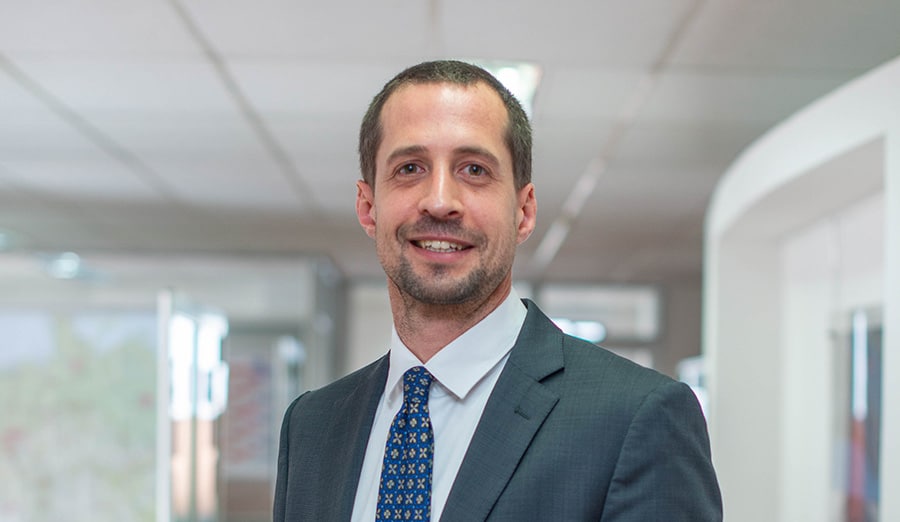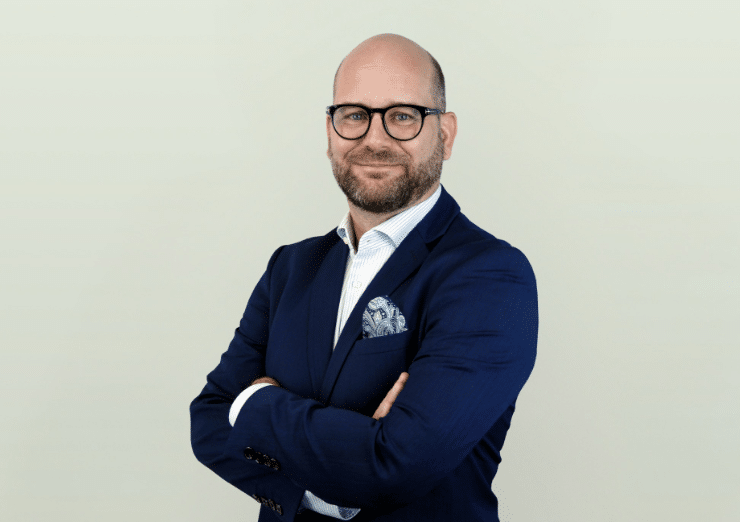Emerging countries
Interview with Edwin Schuh, Managing Director GTAI Mexico and Cuba.
We talked to the GTAI expert about doing business in Mexico and other emerging countries.

Edwin Schuh, Managing Director GTAI Mexiko und Kuba.
Edwin Schuh has been living in Latin and South America for a decade, during which time he has got to know Colombia, Brazil and now Mexico. We talked to him about his professional experiences in these countries, the quality of life and doing business in Mexico. An interview from our #peopleinournetwork series.
Good Morning, Edwin. Thank you for meeting with us today. For a start, would you like to tell us a bit about yourself?
I’ve always wanted to work abroad, and after I finished my master studies, I started working with GTAI and got the opportunity to go to Bogota. That was nine years ago and since then, thanks to the GTAI rotation principle, I was able to spend a total of six years in Colombia, and a year in between in Sao Paulo, Brazil, before I came here to Mexico almost a year ago.
You have lived in Brazil. Colombia and Mexico, and you were also responsible for Venezuela, Ecuador and now Cuba. Comparing these countries, what do you find most noteworthy?
What particularly fascinates me are the differences in these countries. As an outsider, you might think that the countries in Latin America are very similar. In fact, there are significant contrasts, for example economically. On the one hand, Mexico has a strong automotive industry, while Colombia and Brazil are very dependent on raw materials. The same applies to Ecuador and Peru. Agriculture, mining and oil are the dominant industries here.
On the other hand, you have the various political and economic models. There is socialism and planned economy in Cuba, and Venezuela tends in a similar direction. Colombia and Mexico are driven by capitalism, where the state intervenes less. This also leads to higher inequality.
A very small upper class exists that probably has a higher standard of living than you can even imagine in Germany. You can see people flying to work in a helicopter here, for instance. The middle class is slightly larger, and the lower class, where people earn very little despite working hard, is the largest group.
Which of these locations is the most fascinating to you?
During the years 2013 to 2016, there was a very special atmosphere of optimism in Colombia. After the security situation had improved significantly, more and more foreign companies came to the country. German medium-sized companies also discovered Colombia as a location and, for example, opened regional centres in the country as their base location to cover the region. In terms of work, that was obviously a very exciting time.
But here in Mexico, you also live well. The country is so versatile – I particularly like the Yucatán Peninsula, and the Pacific coast also has its charms. Additionally, there are many German companies on-site doing business in Mexico. It is wonderful to live in an emerging country with such modern industry. BMW and Liebherr, for example, have state-of-the-art factories here, which I have already been able to visit. Moreover, the local staff are proud to work there.
How would you describe your relationship with the German Centre? How do German Centre Mexico and GTAI collaborate in terms of doing business in Mexico?
First, it is very important for my work to get in touch with people right away, especially with German medium-sized companies. For example, if I want to do an interview with someone in the packaging sector, I can go downstairs to Multivac, here in the building. Mexico City is quite big, therefore having those companies as neighbours is very convenient.
Second, you and your colleagues at the German Centre are also extremely helpful and get people in touch with each other. Another service I would like to mention is the events that you organise. There’s always a good atmosphere, like the other day when the Bayer Leverkusen players were in the house. It was a unique experience to meet four Bundesliga players in the office.
Let’s talk about the market development in Mexico: How would you describe the current situation? What risks and what opportunities should German companies consider?
The Mexican industry is strong, and currently investments are picking up again after the Covid hiatus, especially in the automotive sector. Clearly visible is the nearshoring trend: suppliers want to be closer to the USA and to their end customers, the automobile manufacturers. Almost all of the latter are already in the country, such as Volkswagen, Audi, BMW, Mercedes and the big Asian and American brands. Now the tier 1 and tier 2 suppliers are following.
Low labour costs, even compared to Asia, are also a good reason for doing business in Mexico. That’s why we see more and more Asian companies opening factories in Mexico. Samsung recently announced a US$500 million investment in a new home appliance factory in northern Mexico. They wouldn’t do that if production in Asia was cheaper. It pays out to produce in Mexico.
For the raw materials and energy sector, doing business is more difficult. For example, the oil industry is dominated by the state-owned company Pemex, which is supported by the government with all means, such as the awarding of concessions. Private companies are hardly able to compete with Pemex. In the energy sector, the situation is similar. Although private providers do exist here, especially in the field of renewable energies. But the government is doing all it can to increase the market share of the state-owned company CFE. In addition to that, the lithium deposits were nationalised in April, therefore the opportunities for mining companies have also decreased.
About Edwin Schuh
Since studying Economics at the University of St. Gallen in Switzerland Edwin Schuh always wanted to work abroad. That is why, after doing exchange semesters in Bangkok (Thailand) and Bogotá (Colombia) and receiving his Master degree, Edwin started working at Germany Trade & Invest (GTAI).
Edwin started in Berlin, and then established a new GTAI office in Bogotá. At that location he was also responsible for Venezuela, Peru and Ecuador. After a short stopover in Sao Paulo (Brazil), he became the director of the GTAI office in Mexiko City in 2020. An important focus of his work is informing German companies about business opportunities in different sectors in Mexiko as well as in Cuba.
What about security? What threats are companies and people facing in the country?
Mexico is an emerging country, after all. You see a lot in the media, cartels fighting each other and the high murder rate. Basically, this is not a direct threat to German companies doing business in Mexico. If you are traveling in areas close to the border, for example in Tijuana, you should take a few precautions. For example, you should not go out on the streets in the evening. Some companies also prefer to book hotels on the US side for their foreign employees.
Another issue is robberies on trucks, for example on the way from the port to the factory. This risk can be reduced with certain measures, for example by riding in a convoy and by equipped the trucks with GPS trackers. But a certain danger persists.
Is the Mexican government putting any effort in increasing foreign investment? Are there any grants?
On federal level, it is currently difficult, but on regional level it looks different. Some states are very interested in settling more industry in their area. The states in the centre of the country and along the US border are particularly committed and professional. There is the so-called “Invest in Mexico” initiative that some of these states have created.
What advice would you give German companies that want to gain a foothold in Mexico?
It’s worth considering Mexico as a whole country when choosing a location, not just Mexico City. Depending on the business focus, other regions might also be suitable as locations, especially for production. For example in the North along the border with the USA. Maybe you may also check out the area closer to the Pacific coast, if you are looking for a connection to Asia.
Another advice for doing business in this emerging country is about currencies, especially in these unprecedented times: Euro, Peso, US Dollar. Employees are often paid in pesos, purchase contracts are concluded in US dollars and anything related to the parent company is settled in euros. Price fluctuations can be significant and need to be monitored closely.
Why should companies have a representative office in Mexico City?
Most companies have at least a representative office or sales office here, even if their factories are spread across the country. The most important political and economic contacts and relationships take place in the capital. Mexico City is the best starting point for this and for taking care of other company locations in the country.
Finally, a completely different question: What do you particularly like about Mexico?
In Mexico, the quality of living is pretty high. This may come as a surprise to some, given the fact that the country does not typically feature the top spots of expat rankings. But those rankings usually tend to take only the hard facts into account. If you look at the soft factors, things look very different. The expat community Internations recently voted Mexico on first place of 52 countries for “best places to live” and I wholeheartedly agree. As an expat, you can live a good and uncomplicated life here, it is very easy to make friends and the Mexicans are very relaxed and can always take some fun out of every situation.
Thank you, Edwin for your time and your insights!
About GTAI
Germany Trade & Invest (GTAI) is the foreign trade agency of the Federal Republic of Germany. With 60 locations worldwide and its partner network, Germany Trade & Invest supports German companies on their way abroad. GTAI promotes Germany as a business location and assists foreign companies in establishing themselves in Germany. Edwin Schuh is director of GTAI Mexico & Cuba, the office is located at German Centre Mexico.
Similar articles
Meet more people in our network!
Have you met Dominique Herold?
An interview with Dominique Herold about working and living in the Tiger State, her passion as a business matchmaker and why Singapore is the best place for expanding businesses.
Rail transportation in Mexico
Gorden A. Rumpff, Head of Mexico at DB Engineering&Consulting. We spoke to him about how rail transportation projects in Mexico work and the challenges they face.



